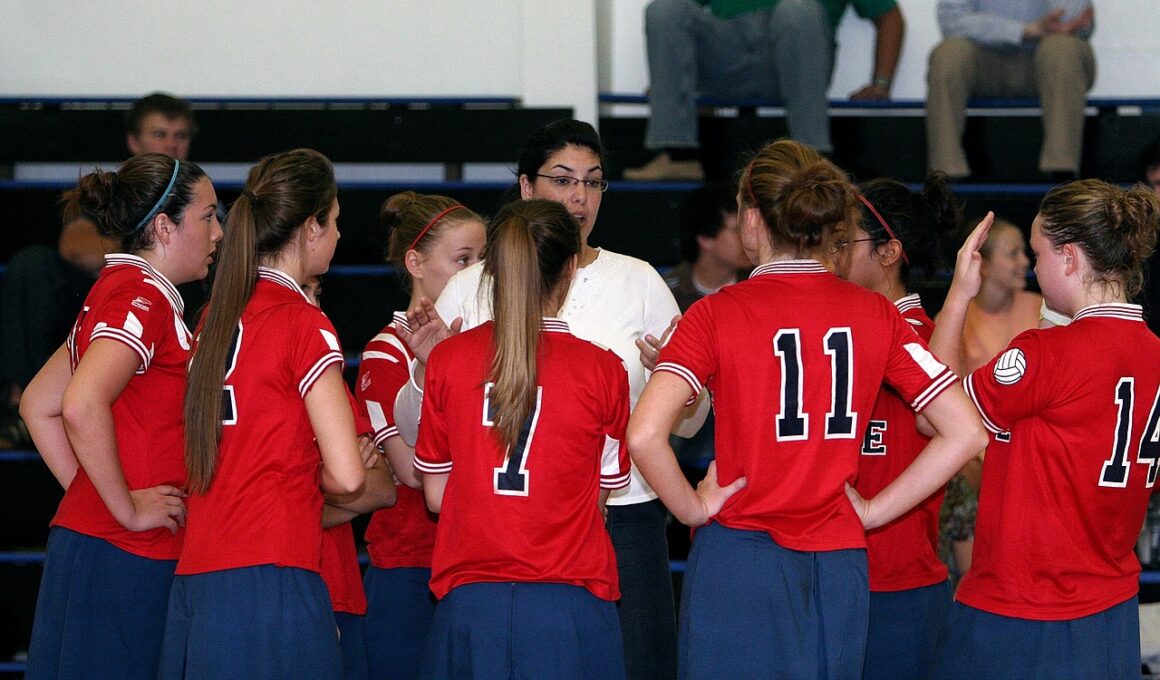Harnessing Motivation Techniques for Volleyball Leaders
Effective leadership in volleyball is vital for team success, and so is harnessing motivational techniques that boost players’ morale. As a leader, you must inspire your team to go beyond their limits. One of the primary techniques involves setting clear goals that are realistic yet challenging. By involving your players in the goal-setting process, you are not only creating a sense of ownership but also fostering accountability. Additionally, utilizing positive reinforcement encourages players to strive harder for their objectives. Celebrate achievements, both big and small, to cultivate a motivated atmosphere. Another important aspect is communication, which should be open and encouraging. Engage in regular one-on-one conversations with your players to understand their individual motivations. Furthermore, it’s essential to model the behavior you wish to promote. By displaying commitment and passion yourself, you will inspire your team to follow suit. Lastly, use team-building exercises to strengthen relationships among players, reinforcing trust, and cooperation. By implementing these motivational techniques, volleyball leaders can significantly enhance their team’s performance and overall experience on the court.
Creating an atmosphere where players feel supported and empowered is crucial for effective volleyball leadership. One fundamental technique involves recognizing the distinct motivations that different players possess. This understanding allows you to tailor your approach to fit individual needs, thus facilitating better engagement. For example, some athletes may respond positively to competition, while others may find motivation through collaborative team efforts. Regularly assess your players’ preferences and adjust your tactics accordingly. Another critical aspect is fostering a growth mindset. Encourage players to view challenges not as obstacles but as opportunities for learning. This shift in perspective can promote resilience and a sense of perseverance. Utilize failure as a teaching moment, helping players to analyze what went wrong and how they can improve. Additionally, maintaining an open line of communication is vital. Create an environment where players feel comfortable sharing their thoughts and concerns. This not only strengthens relationships but also signals to your team that their opinions are valued. Ultimately, cultivating such an atmosphere will lead to enhanced motivation and performance on the volleyball court.
Implementing Effective Team Strategies
As a volleyball leader, implementing effective team strategies is equally important as motivating your players. First and foremost, your strategy should promote inclusivity. Ensure every team member feels like an integral part of the unit by recognizing each individual’s contributions and skills. Regularly rotating positions can help players develop a broader skill set and foster appreciation for each other’s roles. This approach also enhances communication amongst team members, creating opportunities for players to learn from one another. Another crucial element is adaptability. Being a leader means you must be able to assess situations quickly and make necessary adjustments to your strategies. This may involve changing formations, altering practice drills, or revisiting game plans based on the strengths and weaknesses observed in both your team and the opposition. Regularly evaluate team performance. This could entail holding video review sessions or post-match discussions, which enable collective reflection on both successes and areas needing improvement. Fostering a culture of continuous improvement will ultimately enhance performance, enabling the team to advance its skills while maintaining high morale.
Another essential skill for volleyball leaders is the ability to inspire trust and confidence among team members. Building trust requires consistency in your actions and decisions. Show that you are committed to the team’s success and well-being by making decisions based on fairness and transparency. A trustworthy leader creates a safe environment where players can take risks without fear of negative consequences. This encourages them to put forth their best effort. In addition, be open regarding your expectations and priorities. Establishing clear guidelines helps players understand their roles and what they need to accomplish. This also paves the way for accountability, where teammates can rely on one another. Another way to inspire confidence is through your body language. Demonstrating assurance and calmness in high-pressure situations can have a positive impact on how your team performs. When players observe their leader responding with composure, they are more likely to reflect that behavior. Lastly, build rapport with your athletes. Take time to get to know them personally, which strengthens relationships and reinforces the team bond, leading to a more cohesive unit.
Using Emotional Intelligence in Leadership
Emotional intelligence (EI) plays a crucial role in effective volleyball leadership, allowing you to identify and manage your emotions while understanding those of your players. A leader with high EI can recognize when a team member is feeling demotivated and respond accordingly. This strengthens team cohesion and combats negativity, creating a motivating environment. One way to enhance your emotional intelligence is by practicing active listening. Engage with your players by genuinely understanding their needs and concerns. This helps in fostering trust, as athletes feel heard and valued. Additionally, being aware of your own emotions sets the tone for the team. If you project positivity and enthusiasm, your players are likely to mirror these feelings. Training your team to handle pressure, both individually and collectively, is crucial. Encourage open discussions about emotional responses to stresses such as competitive matches. This cultivates an environment where players can discuss mental and emotional challenges, promoting a sense of solidarity. Lastly, model appropriate emotional reactions, teaching players how to navigate pressure while maintaining composure. Successfully integrating emotional intelligence into your leadership approach will undoubtedly benefit your team’s performance.
Another vital aspect of developing volleyball leadership skills is learning how to handle conflicts constructively. Conflicts may arise within a team due to varying personalities or competitive pressures. As a leader, your role is to manage these conflicts by fostering open communication among team members. Encourage players to express their concerns and feelings in a respectful manner to resolve misunderstandings swiftly. Moreover, teach your players the importance of compromise and collaboration. Help them realize that differing opinions can lead to enhanced solutions if approached positively. An effective method for resolving disputes is the use of mediation. When conflicts arise, act as a neutral party to facilitate discussions and guide your players toward a shared understanding. You can also set ground rules for addressing conflicts, ensuring that all parties feel acknowledged. Conflict resolution not only strengthens relationships but also promotes a healthy team environment. It’s essential to reflect on lessons learned from conflicts, using these experiences to encourage personal growth. By mastering conflict-resolution skills, volleyball leaders can build stronger, more united teams focused on achieving shared goals.
Fostering a Supportive Team Culture
Fostering a supportive team culture is paramount for volleyball leaders aiming for success on and off the court. To create such an environment, begin by emphasizing the importance of respect and inclusivity. Encourage your players to appreciate each other’s individuality and contributions. This reinforces bonds among team members and enhances cooperation during practices and matches. Additionally, incorporate team-building activities into your training regimen. Organizing sessions outside of volleyball can strengthen personal relationships and promote unity, making it easier for players to collaborate effectively during intentionally organized practices. Recognizing both individual and team accomplishments helps define a positive, achievement-driven atmosphere. Publicly acknowledge effort and success, as this motivates athletes to continue giving their best. Furthermore, develop mentorship programs where experienced players guide newcomers. This helps create a sense of belonging, fostering a culture of support. Collaboration among team members is vital, ensuring they feel responsibility toward one another. Utilize regular feedback sessions to assess emotional well-being and off-court challenges alike. By nurturing a supportive culture, volleyball leaders can cultivate an environment where players flourish, ultimately boosting overall performance.
In conclusion, mastering motivation techniques as a volleyball leader is key to unlocking the full potential of your team. By understanding individual player needs, fostering communication, and creating inclusive strategies, you can effectively inspire and lead your team. Cultivating emotional intelligence also plays a crucial part. Leaders who empathize with their players can create a climate of trust—one where athletes feel secure and supported. Through conflict resolution skills, you can handle disputes effectively, ensuring that team dynamics remain strong. It is essential also to facilitate a supportive team culture through recognition and mentorship. By taking these steps, you not only enhance individual performance but collectively improve team success. The impact of a well-motivated team on the volleyball court is profound. When teams work in unison, they exhibit greater resilience, adaptability, and efficiency. As a volleyball leader, your role is pivotal in shaping team culture and performance. Implementing the techniques outlined in this article will significantly influence the positive trajectory of both your players and team. Therefore, strive to be that motivating force and create an environment where every player can reach their full potential.


